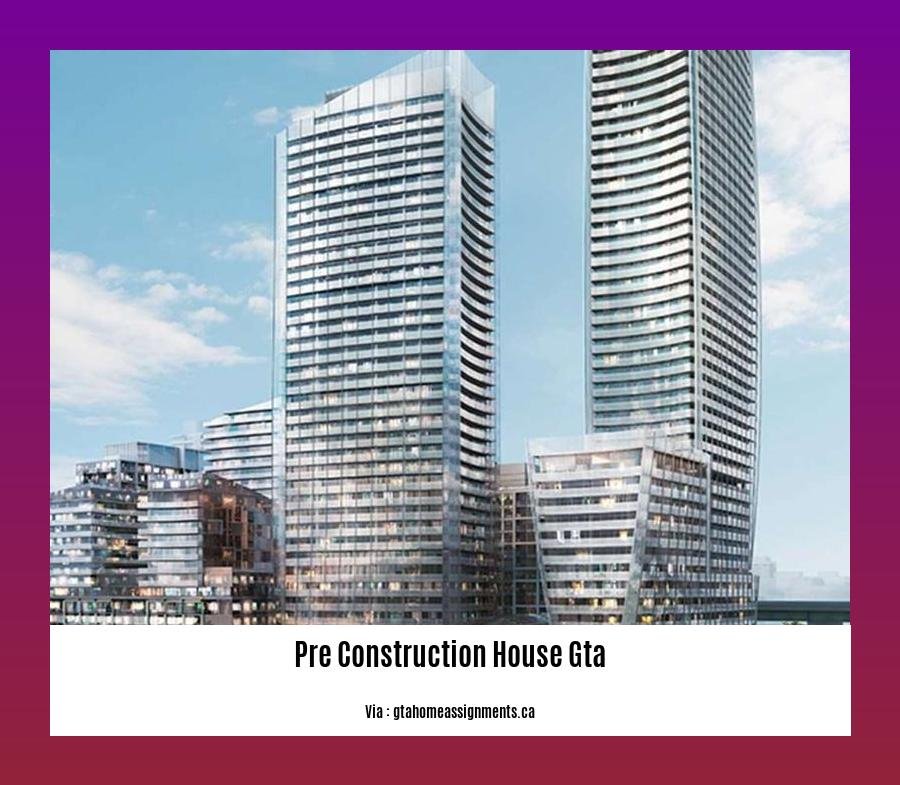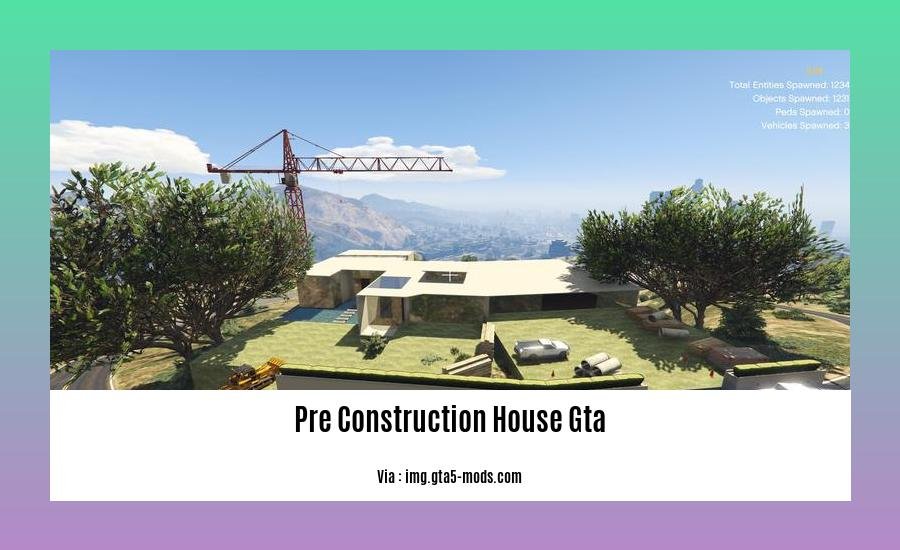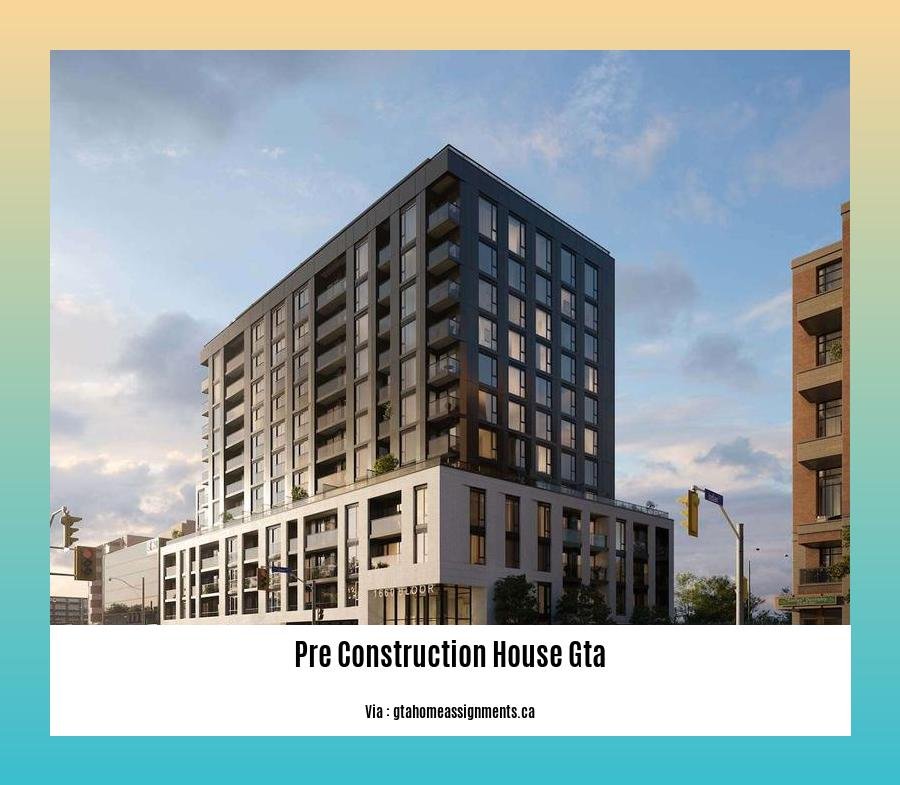Are you considering investing in a pre-construction home in the Greater Toronto Area? Our comprehensive guide, Pre-Construction Homes in the GTA: The Ultimate Guide for Buyers, provides invaluable insights into navigating this dynamic market.
Key Takeaways:
- Pre-construction homes in the GTA offer high investment returns.
- They are more affordable than existing homes, making them suitable for low-to-mid-range earners.
- Real estate agents provide exclusive access to pre-construction projects.
- Townhome prices start from $799,990.
Pre-Construction Homes in the GTA: The Ultimate Guide

Investing in a pre-construction home in the GTA can be lucrative and highly rewarding. Here’s why:
- Incredible Return on Investment: Pre-construction homes have historically offered higher potential returns than traditional homes in the GTA due to appreciation during the construction period.
- Affordability: Compared to existing homes, pre-construction townhomes and condos are more affordable, often suiting low-to-mid income earners.
- Early Access: Working with real estate agents can grant you exclusive first access to pre-construction projects before they’re released to the public.
Why Consider a Pre-Construction Home in the GTA?
- Lower Purchase Price: Pre-construction homes are typically priced lower than comparable existing homes, allowing you to lock in today’s prices before prices rise.
- Modern Amenities: Pre-construction homes often feature the latest amenities and designs, ensuring you have a more comfortable and up-to-date living space.
- Investment Potential: The GTA real estate market is strong, and pre-construction homes have historically provided a stable and profitable investment opportunity.
What Types of Pre-Construction Homes are Available?
- Condominiums: Multiple residential units in a single building, often with shared amenities like gyms and pools.
- Townhomes: Two or three-story units with private entrances and small yards, usually attached to other townhomes in a row.
- Single-Family Homes: Detached homes built on their own lot, offering more space and privacy.
Estimated Pre-Construction Home Prices in the GTA
| House Type | Price Range |
|---|---|
| Townhomes | Starting from $799,990 |
| Condos | Starting from $400,000 |
| Single-Family Homes | Starting from $1,200,000 |
Remember, these prices are approximate and may vary depending on factors like location, size, and amenities.
Are you looking for pre construction homes GTA in the Greater Toronto Area? Look no further! We have a wide selection of new homes in Toronto, Mississauga, and the surrounding areas.
Whether you’re looking for pre construction homes in Toronto, pre construction homes Ontario under $500k, or pre construction townhomes Toronto, we have something for everyone.
Contact us today to learn more about our pre construction homes and to schedule a tour of our model homes. We can also provide you with information on pre construction soil testing cost and other important factors to consider when purchasing a new home.
Key Considerations When Purchasing a Pre-Construction Home

Before making the leap into purchasing a pre-construction home in the GTA, it’s crucial to proceed with caution and weigh in all the Key Considerations When Purchasing a Pre-Construction Home. This isn’t your average house purchase; it’s a future investment that requires a keen eye for detail.
### 1. Builder’s Reputation
Choosing a reputable builder can make or break your pre-construction experience. Research their track record, completion history, and customer testimonials. A solid reputation ensures quality construction, timely completion, and a stress-free buying process.
### 2. Project Location and Neighborhood
Location is paramount! Consider the neighborhood’s proximity to amenities like schools, parks, transit, and shopping. Explore the surrounding area to get a feel for its character, safety, and future development plans. A well-located project can significantly boost your home’s future value.
### 3. Contract and Legal Review
The purchase agreement is your legal agreement; read it meticulously with a fine-toothed comb. Don’t hesitate to consult a lawyer to clarify any confusing clauses or ensure everything aligns with your expectations. Your attorney can safeguard your interests and provide peace of mind.
### 4. Payment Schedule and Deposit Structure
Understand the payment schedule and deposit structure thoroughly. Typically, a pre-construction purchase involves a series of deposits made at different stages of construction. Ensure you’re financially prepared and aware of any penalties for late payments.
### 5. Floor Plan and Unit Selection
Choosing the ideal floor plan and unit is crucial. Consider your lifestyle, future needs, and resale value. Consider factors like square footage, layout, natural light, and any outdoor space. Visit the sales center, study the floor plans, and don’t hesitate to ask questions to make an informed decision.
### 6. Occupancy Date and Delayed Closings
Delays in construction are not uncommon. Be aware of the estimated occupancy date and understand the potential consequences of delayed closings. Ensure you have a plan in place to manage any financial or housing implications should the project experience setbacks.
### 7. Fees and Tariffs
In addition to the purchase price, there may be additional fees and tariffs associated with pre-construction purchases. These can include development charges, closing costs, and HST. Factor these costs into your budget to avoid surprises down the road.
### 8. Assignment Clause
The assignment clause allows you to sell your pre-construction contract before the completion of construction. Understand the terms and conditions of the assignment clause, including any fees or restrictions. It provides flexibility but also has potential implications for your investment.
Key Takeaways:
- Understand the builder’s reputation and project history.
- Research the location and surrounding neighborhood thoroughly.
- Carefully review the purchase agreement and consult a lawyer if needed.
- Be aware of the payment schedule and deposit structure.
- Choose the ideal floor plan and unit based on your needs and preferences.
- Understand the estimated occupancy date and potential consequences of delayed closings.
- Factor in additional fees and tariffs associated with pre-construction purchases.
- Familiarize yourself with the terms of the assignment clause.
Relevant URL Sources:
- The Ultimate Pre-Construction House Buying Guide in Toronto
- Pre-construction Properties: A Deep Dive into Buying a Home Before It’s Built]
Growth Potential and Expected ROI of Pre-Construction Homes
Investing in pre-construction homes offers growth potential and expected ROI due to their lower initial costs compared to existing homes. As the building progresses, the value of your investment appreciates, providing a potential return on value.
Key Takeaways:
- Appreciation during Construction: Pre-construction homes appreciate in value from the initial purchase date until completion, leading to potential ROI.
- Lower Purchase Price: Buying pre-construction homes at the onset allows for significant savings compared to purchasing existing homes.
- Market Growth: The GTA real estate market has historically shown upward trends, which could contribute to further growth in pre-construction home values over time.
When considering pre-construction investments, it’s crucial to research the builder’s reputation, visit the home site, and understand the purchase agreement thoroughly. By following these steps, you can maximize your potential returns and enjoy the benefits of owning a brand-new home.
Relevant URL Sources:
- Why Pre-Construction Condos Are The Best Investment
- The Ultimate Pre-Construction House Buying Guide in Toronto
Tips for Navigating the Pre-Construction Home Market
Key Points:
- Requires extensive research and due diligence
- Consider your financial situation and long-term goals
- Explore different pre-construction projects and compare options
- Understand the legal implications and contractual obligations
- Seek professional advice from an experienced real estate agent or lawyer
Planning and Research:
- Determine your budget, timeline, and preferred location.
- Research the developer’s reputation and track record.
- Visit the site and visualize the neighborhood where the home will be located.
- Review the floor plans, building amenities, and estimated completion date.
Negotiation and Contracts:
- Negotiate the purchase price, closing costs, and any applicable incentives.
- Ensure the contract includes detailed provisions for the deposit, payment schedule, and warranty.
- Understand the contingency clauses and potential exit strategies.
Construction and Occupancy:
- Monitor the construction progress regularly to ensure the quality and adherence to timelines.
- Conduct a thorough home inspection before taking occupancy.
- Be prepared for possible delays and adjust your timeline accordingly.
Additional Tips:
- Get pre-approved for a mortgage before making an offer.
- Read the builder’s warranty and understand its coverage.
- Factor in ongoing maintenance costs and property taxes.
- Consider the potential appreciation or depreciation of the property in the future.
- Remember that pre-construction homes are not without risks, so approach the process with caution and make informed decisions.
Relevant URL Sources:
- The Ultimate Guide to Buying a Pre-Construction Home
- Pre-Construction Condos: A Step-by-Step Guide to Buying
FAQ
Q1: Is buying a pre-construction home a good investment in the GTA?
A1: Yes, pre-construction homes in the GTA offer strong investment potential due to their lower costs, appreciation value, and rental market opportunities.
Q2: How do I choose a reputable builder for a pre-construction home?
A2: Research the builder’s past projects, completion records, and reputation in the industry. Visit model homes and read online reviews to gauge their quality and customer service.
Q3: What are some of the advantages of buying a pre-construction home?
A3: Advantages include the ability to customize the home, lock in today’s prices, access modern amenities and technologies, and potentially benefit from appreciation in value.
Q4: What are some of the potential drawbacks of buying a pre-construction home?
A4: Drawbacks include the higher cost compared to existing homes, potential delays in occupancy, and limited availability due to high demand.
Q5: How do I get started with the process of buying a pre-construction home?
A5: Start by finding a real estate agent who specializes in pre-construction homes in the GTA. They can provide guidance, access to exclusive projects, and assist with negotiations and paperwork.
- The Best Battery Picture Lamps for Effortless Artwork Illumination - April 1, 2025
- Double Sink Bath Vanity Tops: A Buyer’s Guide - April 1, 2025
- Bath Towel Measurements: A Complete Guide to Choosing the Right Size - April 1, 2025










